Horace Dediu: what it means to be a professional analyst in the field of smartphones
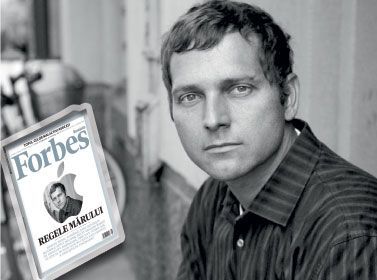 [Approx. transl.]: I bring to your attention a translation of the transcript of an interview with one of the most interesting and prominent experts, who pays special attention to analyzing the activities of Apple. I am sure that in the light of the upcoming special event of this company, familiarity with such an expert as Horace Dediu ( Horace Dediu ), will make a significant contribution to the understanding of the activities of Apple and its competitors.
[Approx. transl.]: I bring to your attention a translation of the transcript of an interview with one of the most interesting and prominent experts, who pays special attention to analyzing the activities of Apple. I am sure that in the light of the upcoming special event of this company, familiarity with such an expert as Horace Dediu ( Horace Dediu ), will make a significant contribution to the understanding of the activities of Apple and its competitors.This transcript is based on an interview with Horace Dediu conducted by Dan Benjamin ( Dan Benjamin ) in one of the issues of the guest podcast Dan (The Pipeline, issue 52).
Horace Dediu and Dan Benjamin discuss what it means to be a professional analyst in the field of smartphones, as Horace founded Asymco.com and got a audience of half a million readers in just 9 months, and also cover topics such as: conducting research in various areas of the market, language business, design, asymmetry, courage, the importance of understanding the basics of the business, the era of post-PC and the concept of disruptive innovation.
')
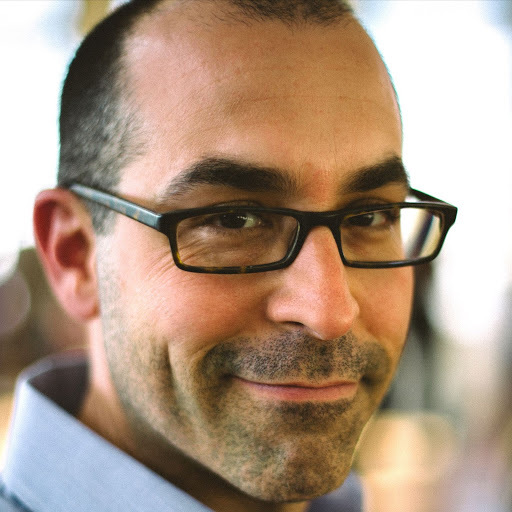 Dan Benjamin: This is the “The Pipeline” show, which is being interviewed. His lead is Dan Benjamin. It's me. My guest, Horace Dediu, is the founder of Asymco.com and the author of market research published on it. He also works as an independent analyst and consultant in the field of telecommunications and mobile platforms. He has a wealth of experience: Horace worked at Nokia and has established himself as an analyst very well. I am extremely happy that he was able to participate in today's show. Horace, welcome.
Dan Benjamin: This is the “The Pipeline” show, which is being interviewed. His lead is Dan Benjamin. It's me. My guest, Horace Dediu, is the founder of Asymco.com and the author of market research published on it. He also works as an independent analyst and consultant in the field of telecommunications and mobile platforms. He has a wealth of experience: Horace worked at Nokia and has established himself as an analyst very well. I am extremely happy that he was able to participate in today's show. Horace, welcome.Horace Dediu: Thank you.
Dan: Many are familiar with your work under the auspices of the Asymco project. But not everyone knows what kind of person is behind them. A man with outstanding abilities in analytics and forecasting. Before we get into the details, please introduce our listeners, some of whom hears about Asymco.com for the first time, with their project.
Horace: It all began with an application development company. Working on materials for a corporate website, the purpose of which was to create an expert image of the company, I started a blog. It interested me much more than directly developing, which, however, I still do. Although I do not advertise it, but sometimes I really work with local clients, mostly from Finland.
Anyway, I created a website to show my level of competence, and as a result, it became quite a popular place for discussions and debates about the strategic aspect of the development of the mobile industry, the new world of smartphones and the post-PC era. These topics are considered mainly from the analytical and strategic points of view, and technological issues are also raised. This is not a news site. It is rather directed towards detailed analytics. We try to identify cause-effect relationships, which requires the availability of data and analysis of open sources, telling about the situation on the market.
Being "guides in the world of business intelligence", as noted in the website header, we observe what is happening in the market and try to collect relevant data. Comparing such data with market peripetias, we develop discussion. Including in the comments.
Horace Dediu: “I always start with numbers” (The Pipeline podcast, Issue 52, 2011).

Dan: You play it down and very modestly describe your work. However, in order to understand certain things, you have to look through very large amounts of information. The output is incredibly valuable [material] ... In general, Edward Tufti would be proud of you. You present information graphically incredibly compact and carefully thought out. I just read an article about it in Fortune in the morning. It said that you were able to give an equally accurate sales forecast for the iPhone, which was compared with the forecast of Mark Moscovitz from JP Morgan, regarding data from Apple itself.
Horace: In general, yes, we have many directions. According to one of them, we ... More precisely, "I". There are no "we", in fact. I do this alone. I try to visualize everything. Quoting your Twitter account : “I use words as an explanation of what the numbers tell us.” In short, I always start with numbers. I take a pivot table or a blank sheet of paper and start thinking. As a result, a hypothesis is born, after which I turn to argumentation, but in my thoughts I really start from data.
Having spent a tremendous amount of time processing data and trying to present it to people properly, without realizing it, I came to the data representation model of Edward Tufty. And this despite the fact that I have never attended his classes. Just read the book. But I, besides, also have extremely high demands on the visual design of the data. Some people perceive information better visually, others prefer tables with dry numbers. But as for me, even if there are only three values, it is more convenient to look at them in the form of a diagram. Such a presentation helps me to interpret their meaning.
Working with a large amount of data, I try to make my creative contribution to their most visual presentation, so that, looking at them, people will immediately understand what I am trying to say. Words serve only to emphasize certain points. This is necessary to form a certain “foundation” of the discussion, on which subsequent comments of readers will be based. True, sometimes I just publish a diagram with the words: “After the amount of time I had to spend on preparing this diagram, I’m not even going to think about writing any comments to it”.
Dan: [laughing] No wonder.
Horace: I could say that “the diagram speaks for itself,” but then my readers would start asking me exactly to explain what was happening. This is a false path. There are enough numbers for me, but I use words to emphasize [the meaning of numbers] and to focus the attention of readers on certain aspects.
Horace Dediu: “Despite the fact that I understand how a business works, I still look at the world more from the position of an engineer than from the position of a professional analyst” (The Pipeline podcast, issue 52, 2011).
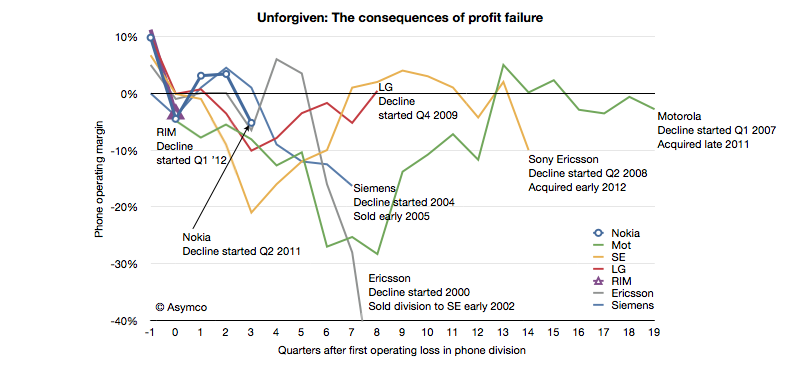
An example of one of the Horace diagrams: Depressive mood among a number of mobile device manufacturers.
Dan: I'm impressed that you really think that way. It seems that you really mentally operate with images. Could you tell us more about it? What was the basis of your approach to work?
Horace: In my family, everyone was somehow connected with science, more precisely with mathematics. Father has a doctorate in mathematics, and a mother has a master’s degree. They both taught. Therefore, I grew up surrounded by numbers and a scientific approach to thinking, and then I graduated from a university in the United States. By the way, I'm not Native American. I come from Romania. My family emigrated to the USA, where most of my life was spent. I am an expat living in Finland. He married in Finland, my son was also born in Finland, but I am a US citizen.
Anyway, I went to a technology college in the USA. I was far beyond 20 years old when I first thought about my business. At that time I was working in a research laboratory and decided to concentrate on the IT field in order to gain relevant experience and knowledge in practice. Then I decided to get a business education, and I was lucky - I was able to go to Harvard. There I learned the language of business.
True, I really did not learn anything else. Despite the fact that I understand how a business works, I still look at the world more from the point of view of an engineer than from a position of a professional analyst. In my understanding, a professional analyst is a person who has experience in doing business and has received an economic, but not a technical education. There is nothing bad in it, but I grew up in an atmosphere that welcomed the scientific approach to the things around me.
This is what I try to convey on my website. Despite the fact that so far we cannot conduct research in this area in their canonical sense, I propose a very similar approach in the framework of information exchange, peer review, citation and openness. All this applies to business intelligence discussions.
In my opinion, the business itself can be compared with the "Middle Ages", more precisely with the era of Proto-Renaissance. During the Renaissance period, people saw a benefit in sharing information, and not in protecting it. This can be traced in science, architecture, etc. Newton’s work is precisely in this period of “openness,” which has not yet found support in the minds of businessmen. I am not naive about this, and I understand that there are good reasons for this. But ideally, I would like to make the process that we call business intelligence more scientific. As for my audience, if I can talk about it here ...
Dan: Yes, please.
Horace: The fact is that I know my audience only from followers' biographies on Twitter, that is, only what they thought was necessary to tell about themselves. However, judging by the description, they seem to be very tech-savvy people. I was the same in my 20. Technical education was pushing me to look for patterns in business - I wanted to understand how the world works. At the same time, knowledge in various fields of science and engineering did not help me much to understand the reasons for the unfortunate state of affairs in the company in which I worked.
In general, once again, if we talk about my goal, then I try to convey information to the audience without moralizing or mentoring tone. I just unobtrusively put forward a sort of theory for discussion (I call it “business theory”) so that people can digress for a moment and say: “Wait a minute. Would you like to say that there is a certain theory, like theories in physics? There are a huge number of areas in science and there is still nothing like this in business? Can it, nevertheless, exist? ”. I have to hint that such a direction really exists, and you can think about it in this vein.
This is my dream. In this regard, I am not alone. I mean people who revolve in the scientific circles of business schools, but at the same time they are far from today's world of technology, which needs business theory just today. Perhaps Asymco’s success is precisely due to the presence of such interest and the intersection of these two areas.
Horace Dediu: “I am doing a great job and I try to bring as much material as possible to public discussion and criticism, receiving in return for pointing out mistakes made” (The Pipeline podcast, issue 52, 2011).
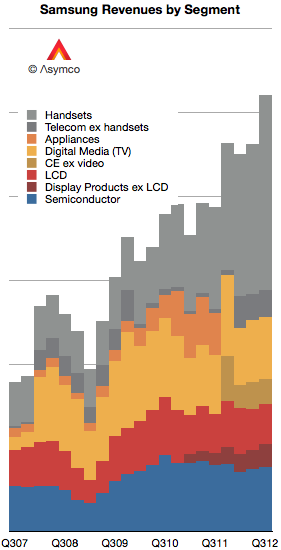 Dan: Probably, your knowledge in the field of engineering gives you ... I don't know if the word “advantage” is appropriate, but let it be. The advantage over, say, the staff of JP Morgan. And you manage to better understand what is happening thanks to this. What do you think you yourself?
Dan: Probably, your knowledge in the field of engineering gives you ... I don't know if the word “advantage” is appropriate, but let it be. The advantage over, say, the staff of JP Morgan. And you manage to better understand what is happening thanks to this. What do you think you yourself?Horace: Knowledge helps, but it's not about them. The point is the approach to the problem. I also learned a lot from my blogging experiment ... In the last year of working at Nokia, or so (I worked there for 8 years), I also occasionally updated my blog. When you write, you learn a lot, and when people comment, you learn even more. Most teachers will tell you that teaching is one way to learn. My vision of this is explained by the fact that I openly share my approach to thinking and what I do. I try to share everything I can. For example, I somehow thought about something: on the plane, many of those who work in the corporate sector use special protective screens that prevent outsiders from seeing what they are doing.
Dan: To the point.
Horace: If, during the flight, someone sitting next to me looks at my computer and asks what I do, I will only be happy to share information with him. This is the essence of asymmetry in Asymco. It lies in the fact that I am doing a great job and I try to bring as much material as possible to public discussion and criticism, receiving in return an indication of mistakes made.
So I learn from the audience. Frankly, this is how I get smarter. The key point is just the openness of the process itself, rather than a statement of the fact that I know more than others (even if this is true on some issues). Take the analyst from JP Morgan. He is severely limited to a small number of people from whom he can receive the necessary criticism - by his colleagues. But even they, probably for "political" reasons, sometimes do not enter into discussion. In other words, the analyst works without help, whereas about 13,000 people help me. I am happy to rely on them and the more I do it, the more I will learn. And this, in turn, is reflected in the rest.
Dan: Based on your words, there is something bold in this approach. The desire to be open suggests that you are not afraid of either criticism or error.
Horace: It's not quite like that. In fact, we learn only when someone points out a mistake to us. I do not want to wake up in the middle of the night just so that someone will tell me that I was right. Otherwise, I'm ready to jump out of bed to correct the error. It will teach me something ...
Today I published a post in which I criticized myself for the mistakes made in previous profit forecasts. They covered some aspects related to the iPad, which I did not know. In the process of all this, I learned one very important thing: no one knew what would come out of the iPad. Even those who insisted that they had information from secret anonymous sources in the field of supply were wrong. No one knew, and even if he knew, then at least one of the fifty analysts would not be mistaken in his prediction. This was a kind of lesson for me. There is a huge number of similar, barely perceptible subtleties that take place when you write, publish and listen to criticism of your work.
As another example, I can cite my assumption that I do not fully understand where I am going. In fact, nobody fully understands this. I remember there was such an engineer: Werner von Braun (he developed the Saturn 5 rocket, which was able to lift us to the moon). His famous phrase: “When I don’t know what exactly to do, I do research.” I really do not know what to do, and there is nothing like that in it. It makes me constantly improve and, perhaps, makes my predictions somewhat more accurate with respect to the rest.
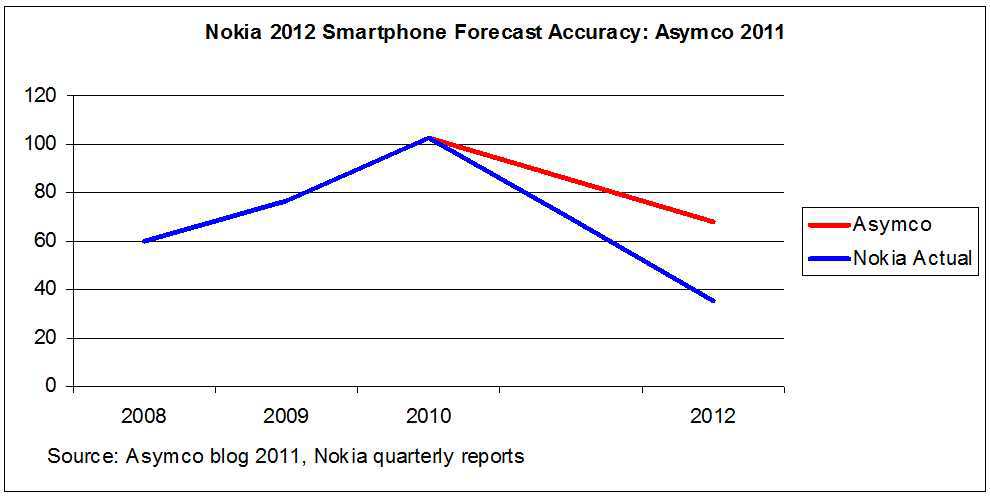
An example of one of the episodes of parsing the mistakes made by Horace in his predictions
Dan: One of the side effects of creating such unique content is focusing on certain things. Your publications are related not so much to the mobile industry itself, but to the smartphone market. Definitely, iPads and other large screen mobile devices fall into this category. Can you talk about it? Why smartphones? Undoubtedly, this topic is quite popular now, but this is not only the point.
Horace: Actually, I have been interested in this topic for 10 years. I started using a smartphone in 1999. It was the Nokia Communicator , which looked like a small brick. In the literal sense of the word. Its processor was built on the basis of the 386th architecture. This smartphone had a fairly large screen, and it worked under the GEOS OS, which no longer exists. But it was really a real computer with a real keyboard. At that time there was nothing like that. Still, it was 1999.
At this time, Palm also worked. Her handheld computers at that time were quite popular for several years, but they were not communicators. They were isolated, i.e. tied to a computer ... like an iPad today [ i.e. in 2011 - approx. trans. ]. When I used this product, the thought struck me: “This is how all computers will look in the future.” I simply did not know when, how this would happen, and who would turn it into reality. Partly on a subconscious level, I decided to find out. At that time I thought that for this I would need to learn a lot of new things. I have a lot of questions: from whom can I get the necessary information? From a startup? From an existing PC manufacturing company that will one day make them so miniature? Or from the company that produces phones that will turn them into a kind of PC? In the end, I went to the telephone company, because they got the closest to the issue.
It was Nokia. A promising company that manufactured such devices. Honestly, I got there partly based on these considerations, and partly because the dot-com bubble burst and I needed a job. There were many reasons, but, by and large, I really thought that such an innovation would come from the world of telecommunications, that a player would come from this sphere and destroy the PC world. In fact, for many years it really looked like that. Nokia has successfully launched a range of smartphones. They were sold in tens of millions until the moment when representatives of the computer world of the “old school” turned their attention to them. And the PC world did not give up so quickly.
The second half of the last decade amazing things happened, in the center of which was Apple. Microsoft also took part, although it failed ... after which Google pulled itself up. The guys from the west coast of the United States caused such a storm in this industry that they demolished everything that was used consistently in Europe and Asia. Frankly, it was a lesson to me. I was wrong about the fact that telecommunications companies will prevail. Since then, I have scrolled back and forth in my head: the undermining of the telecommunications sector was carried out precisely by computer companies, which initiated the outflow of capital from this sphere. And it continues to this day. Many may argue with this statement, but I am convinced that this is so and that the trend will continue in the future. Only today [ i.e. in 2011 - approx. trans. ] we were struck by the information that Apple was ahead of Nokia in the number of handset sales in the global market.
Dan: Amazing.
Horace Dediu: “Now imagine how 2004 was different from today's. There was no Google back then. ”(The Pipeline podcast, Issue 52, 2011).
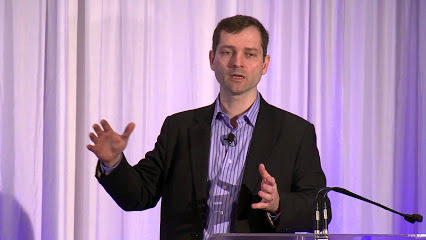 Horace: In principle, Apple was already the most profitable company before. Back in 2008. But now they will get even more benefits without becoming a leader in the number of devices sold. As I said, we are witnessing a transition of cash flows from telecommunications companies to pioneers from the PC world. In fact, Google is also striving for this, although they do not have such high profits at the moment. They are only moving towards their intended goal.
Horace: In principle, Apple was already the most profitable company before. Back in 2008. But now they will get even more benefits without becoming a leader in the number of devices sold. As I said, we are witnessing a transition of cash flows from telecommunications companies to pioneers from the PC world. In fact, Google is also striving for this, although they do not have such high profits at the moment. They are only moving towards their intended goal.Anyway, the process of my self-study, which lasted a decade, was very impressive. At this time, I worked as an analyst at Nokia and I must admit that, trying to understand all this, I earned quite a few bumps. In 2004, as I recall, I was engaged in forecasts of the smartphone market, i.e. tried to understand which competing platforms would remain, understand ...
Dan: Did you do this at Nokia?
Horace: Exactly. In 2004, my job duties included forecasting, similar to what IDC and Gartner do. Today, such documents consist mainly of forecasts on the separation of market shares by mobile platforms. Now imagine how much 2004 was different from today. Then there was no google.
Dan: Yeah.
Horace: I mean that at that time there was neither Android nor on the market ... There was basically only Windows Mobile, although there were quite a lot of other players. Among the competing platforms one could come across Windows Mobile, Palm OS, Nokia's Symbian and even BREW and JAVA-compatible solutions.
For me, it was like deja vu, because this has already happened in the past, albeit with other companies. Today, many will tell you that they can predict the situation, because they finally know what is happening. But then they were far behind. Employees of Gartner and IDC did not even try to analyze the smartphone market in 2005, because the concept of “smartphone” did not exist for them. They had no customers willing to do research on this market. They did not even analyze the phone market. Their work was focused on the CCP.
Dan: Yes, you're right.
Horace: Their customers were from IT. I think it is too early to talk about long-term prospects, because everything is changing rapidly. This is one of the most dynamic areas, in terms of development, of those that I have seen. We are seeing both an incredible rise in this industry and its high instability. , , - . 5 , . , 4 5 , , .
: 2011 ( ) , -. , , iPad , - , . ? , , , , - ?
: , . , , . . . -, . - , -. , , – . Windows, , Windows Microsoft. However, this is not quite true. - , …
: « , ». . . . It is not right. , . , ().
, , iPad , , , . , . .
« -» , . , . , . , «», . : - , .
, , , . Windows, , ( ). , - .
: , , , , . , , . ? , ?
: , . , , - , . , , … , .
, . (, ), . - , . .
, , ( , ). , , . . 13000 . , . , , . . , .
: , , , . .
:Thanks for the opportunity. I really liked it.
Source: https://habr.com/ru/post/235055/
All Articles